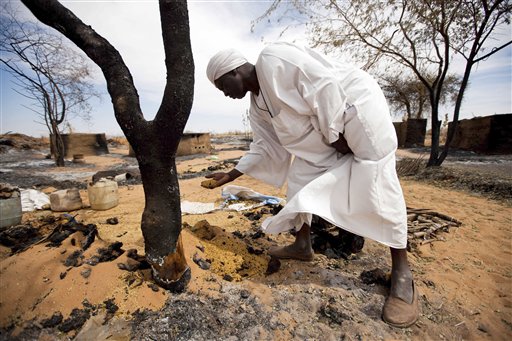
Editor's Note: This op-ed originally appeared in The Daily Beast.
The Janjaweed militias are back. The Sudanese government’s notorious paramilitary force and favorite instrument of counterinsurgency—which earned infamy at the height of Darfur’s genocide in the mid-2000s—has unleashed several scorched-earth campaigns in 2013 that have ethnically cleansed entire communities off their land, displacing hundreds of thousands of Darfurians. Fueled by complex economic agendas, Khartoum’s alliance with and support for these militias has led to a comeback of infamous Janjaweed leader Ali Kosheib, already indicted for war crimes by the International Criminal Court. Kosheib’s forces are torching villages and targeting civilians again on the basis of their identity.
This time, though, there are no witnesses. The regime in Khartoum is systematically denying access to journalists, aid workers, and U.N. peacekeepers, so the killing, looting, and burning occur in total silence.
Diplomats and news reports have peddled a very different narrative over the past year. U.N. and other officials have insisted that the Darfur civil war is largely over and peace would come if the main rebel groups would sign existing deals. Media reports have largely focused on “inter-tribal” conflict or fighting among rebel groups. Even Wikipedia lists Ali Kosheib as a “former” Janjaweed commander. These story lines couldn’t be further from the truth.
If you ask Khadija, who now lives in a refugee camp on the border of Sudan and Chad, a wholly different picture emerges. ICC indictee Ali Kosheib came to her village in West Darfur with 16 truckloads of Janjaweed militia in mid-April. “I stayed without moving, laying down in my field from morning to evening while they burned my village and crops,” she said. Some of her neighbors were tied down and tortured, and her youngest son, Adam, was killed. “If Sudan became healthy, I would go back with my people. But if Sudan continues on this path, there is no way we can go home. What I have seen is too much.”
Notwithstanding the “inter-tribal” narrative, large-scale violence in Darfur is systematic, state-sponsored, and driven by three objectives. First, in North Darfur, Khartoum-backed Janjaweed militias strategically cleared local Arab and non-Arab populations from the areas around newly discovered gold mines in order to consolidate government control of rapidly expanding gold exports, critical in replacing lost oil revenue after South Sudan’s independence in 2011. Second, in West Darfur, some of the most productive land in Sudan is being cleared of its inhabitants by Ali Kosheib’s forces in order to expand the territory offered to favored ethnic groups or sell to Gulf investors.
Third, expanded Janjaweed looting and extortion schemes as well as smuggling networks for gum arabic (used in soft drinks and candies) are encouraged by the Khartoum regime as part of militia compensation. “They loot whatever they can carry,” said Abdul, a refugee camp resident, “and burn whatever they can’t.” Government-sponsored “reconciliation conferences” have become venues for extortion by Janjaweed elements who demand huge payoffs to prevent further attacks.
Read the full article here.
John Prendergast is co-founder of the Enough Project and the Satellite Sentinel Project. Omer Ismail is a Sudanese activist on Darfur and a Senior Advisor to the Enough Project.
Photo: Attahi Mohammed Sigit, a resident of North Darfur, examines the destruction caused by an attack last November that left his son and several other community members dead. (Albert González Farran/UNAMID/AP)

